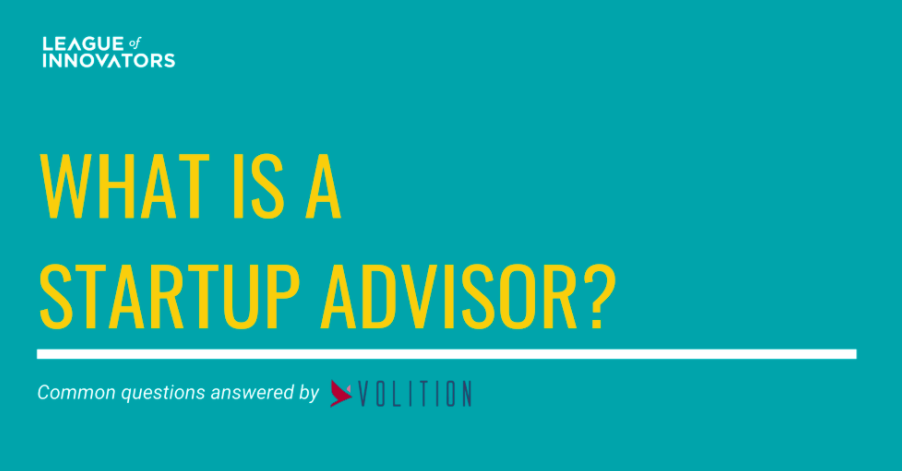
When you’re just starting out on your journey as an entrepreneur there’s often this (primarily self imposed) pressure to do it all--to learn how to do everything and wear all the hats. And while there are a lot of things that a Founder or founding team does need to know and do, it’s just as important to know where your gaps are and learn how to ask for help.
In the world of startups, this support often comes in the form of either mentorship or advisory--to be clear, these are not the same things, and we will dig into the differences later on in the article.
If you have questions about next steps--where to find an Advisor, how to compensate them, how to manage that relationship--you’re not alone. At Volition, one of the things that we do is help startups navigate these questions and assess if they need an Advisor, and if so, what exactly they need support on.
As a 20-year entrepreneur of Managing Partner of Volition, we’ve asked Paul Brassard to answer some of the most common questions that we and the League of Innovators team hear about Startup Advisors.
First up, what is a Startup Advisor?
An Advisor is an individual who is a subject matter expert, or is a highly experienced generalist, and provides key guidance, advice, support, and oftentimes resources, to help a company address their knowledge gaps and weaknesses and/or to help them excel at their strengths. This is almost always a compensated role, often but not always with equity (more on this later!).
An Advisor can provide essential guidance and knowledge at key moments during your startup’s growth, and can help you get through challenges that come with growing a company. A solid Advisor will provide a high level of expertise and experience targeted to your needs, with the added bonus of often lending a known industry name to your brand, providing a boost in legitimacy.
And how do I know when I need to look for one?
As companies are built and begin to grow, there will almost always be gaps in knowledge and areas of weakness on the founding team. For example, many startups are launched with a technical founder who might not have any business experience, in which case a Business Advisor would be beneficial for those first stages. Or sometimes a founding team may cover the bases of business, tech and marketing but not have experience with sales--this is where a Sales Advisor could be a great addition.
As soon as a founder, or founding team identifies (and admits) that they have gaps or weaknesses they should begin the process of identifying potential Advisors that fit their needs.
How do I find an advisor that’s a good fit?
As mentioned above, you first need to identify your gaps--often they fall under marketing, sales or business experience--and ask your network to introduce you to people that can help fill those gaps, especially if they have relevant experience. Note: this is also a solid ask for a pitch.
THEN, network, network. network.
Know that an Advisor needs to be reliable and available to commit the time and energy you need to meet your goals. Once you have identified what kind of Advisor you need, make sure to look for someone who demonstrates this reliability and doesn’t express concern with committing a reasonable and realistic amount of time.
A good approach is to think of an Advisor as an investor in the business, in the sense that they are going to be spending their time, providing their knowledge and expertise, and potentially even opening some doors; providing connections and creating opportunities you wouldn’t have otherwise made on your own. But, also think of them as a team member and ask yourself: “Would I want this person on our team?”
Ok, so once I’ve secured an Advisor, how do I manage the relationship?
I tend to find earlier stage companies need more help so don’t just manage but maintain the relationship by providing regular and frequent updates, say once every week or two by email, especially depending on progress and/or need for help and guidance.
Pre- (or Post!) COVID I would have also suggested to do a once per month coffee (at least!) with your Advisor; for now, until it’s safe, you can displace that with a “virtual” coffee and catch up. If you have a group of Advisors, schedule a group meeting for company updates, but make sure to book individual meetings with subject matter experts within that group, as needed.
And what do I need to think about in terms of fair compensation?
Always consult a trusted startup lawyer before issuing any form of documentation.
A standard Advisory agreement tends to be 1 or 2%, reverse-vested over a four year term, with a one year cliff. The cliff of one year is so that you can make sure you get the value from the Advisor before issuing the equity (likely as options), and ultimately means that they are not assigned the first portion of shares until after the first year, and they receive the remainder over time, usually calculated on a monthly basis.
Numbers ARE variables, so I have seen where any or all of those variables, either percentage or shares or time can be adjusted based on the negotiation with the Advisor and/or their level of work/commitment.
Some Advisors may not ask for equity, and some may ask for non-equitable compensation. Ultimately, you need to do what’s best for you and your company, and remember that you often get what you pay for but also that equity may be worth more than you think.
Shameless plug: Volition does not believe in taking equity from founders, and charges a per session fee to our clients, with no equity stake.
Last but certainly not least, what exactly is the difference between an advisor and a mentor?
This question comes up a lot at our pitch events as the terms are often confused. An Advisor cares about the company as a whole, and is almost always a compensated role. A Mentor is a personal one-on-one relationship that you will likely have for a long time and may never meet the rest of the team.
Also, I believe a Mentor should never be remunerated for this role as the mentoring relationship is intended to be a two-way street and not a service. Think of your mentor as more of a guide and know that they often get just as much out of the relationship as you do (check out this article!). If you really feel the need to ‘give back’ when it comes to mentoring, consider paying it forward instead, or grab your mentor a thank-you card and let them know the impact they have made.
Have more questions? Feel free to book Volition Managing Partners Paul Brassard or Melanie Ewan for a 20-min chat to talk it through!



